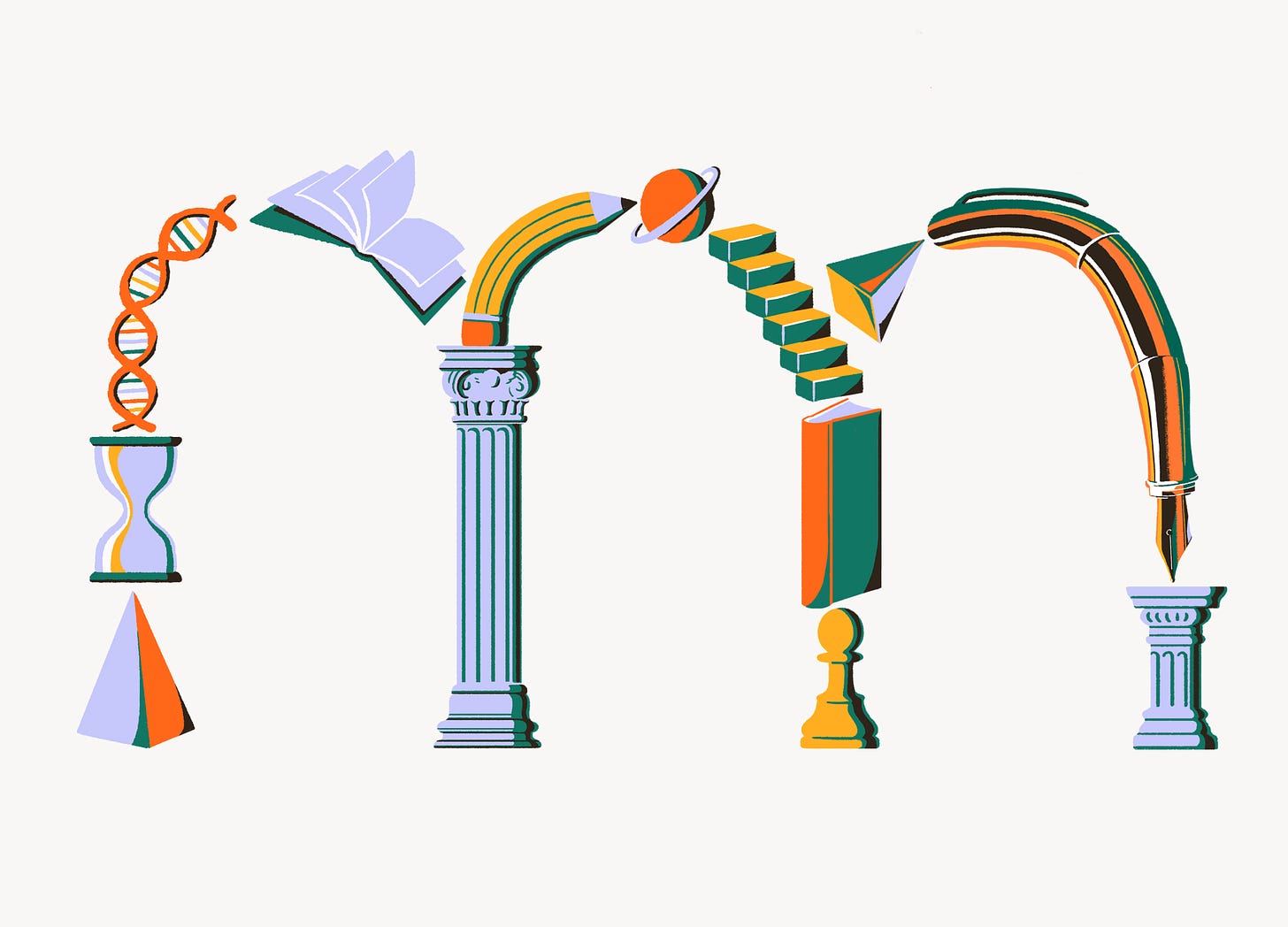The new academy: modern intellectuals are writing their best ideas on Substack
Welcoming Richard Dawkins to Substack
For centuries, academia was confined within the hallowed walls of ivory towers. With the advent of the internet, it burst forth into the digital world, reaching broader audiences and sparking intellectual conversations outside of traditional confines.
As these winds of change blew more forcefully, Substack emerged as a unique vessel for this evolution, and I believe that in the coming years it will continue to both complement and disrupt intellectual establishments.
On Substack, scholars aren’t bound by the traditional, slow and scarce platforms for publishing their ideas and thinking in the journals of their fields.
They can share their research, insights, and ideas in a more accessible and immediate manner, fostering a genuine connection with readers who are passionate about their areas of expertise. In addition, academics are also earning substantial revenue from their publications.
Despite this, old dogs are weary of new tricks, and often for good reason. When I first reached out to social psychologist and author
, he told me:“I am glad to hear of your interest. But I must hide away to write a book for the next 12 months. I cannot write a single other thing. I admire what you are doing, but I just never have the time to do anything like a Substack.”
Jon’s standpoint isn’t unique, and I’m sympathetic to it. Academics are often locked in a tug-of-war between competing obligations, and the thought of piling another commitment can be overwhelming.
Much of my work is focused on helping academics establish a sustainable publishing strategy on Substack, and I had suggested Jon might consider using Substack as a platform to explore the themes of his book, inviting criticism that could help him refine his manuscript. I am thrilled to say he found merit in the proposal. On his new Substack’s About page, he explains part of his rationale for launching
on Substack:“I could make this Substack an adjunct to my writing, where I could share findings, theories, and questions while inviting the kind of criticism that I’d rather get before I submit the manuscripts than after each book is published.”
Through his Substack, Jon is modeling a new and exciting way for academics to communicate directly with readers. He’s creating an avenue for collaborative feedback, akin to crowdsourced peer review but with the added advantage of early engagement. He’s also expanding the audience for his upcoming books and raising significant funds for his nonprofit organizations. Jon is not alone.
Welcoming Richard Dawkins to Substack
This week,
is launching on Substack.An esteemed evolutionary biologist, prolific writer, and passionate advocate for science and reason, Richard has captivated audiences with his thought-provoking ideas and unwavering dedication to the pursuit of knowledge.
His groundbreaking work, including The Selfish Gene and The God Delusion, has sparked robust debate, challenged conventional thinking, and inspired countless individuals to critically examine their beliefs. Richard’s unyielding commitment to promoting scientific literacy and fostering a deeper understanding of our natural world has earned him both admiration and controversy, cementing his status as a prominent figure in the realms of science and intellectual discourse. Regarding the launch of
, Richard said:“It should be an atmosphere of continual questioning, recurrent uncertainty, and I hope stimulating dialogue.”
The blossoming of academic courses on Substack is another intriguing development.
is a Substack by , an assistant dean and senior lecturer at the Yale Jackson School of Global Affairs and a former FBI special agent. The concept of the platform is inspired by a historical initiative from 1959, known as the Freedom Academy, proposed to educate government officials, journalists, and citizens about Soviet propaganda and disinformation.Asha’s Substack aims to revive this concept of a knowledge hub where people can learn about disinformation, its impact on democracy, and how adversaries manipulate societal perceptions. It serves as a sort of “citizens’ academy” for democracy in the modern information age, focusing particularly on cyberspace as the primary battlefield.
Amid the deluge of data and news, Substack’s academics are illuminating complex subjects with clarity and depth.
uses her expertise in analyzing complex economic issues to present evidence-based insights that enable parents to make informed, confident decisions. ’s lucid analysis of historical and current political events brings enlightening context to the complexities of modern life; her Substack is like a time-traveling compass for understanding today’s politics. combines his deep understanding of economics and international relations with clear writing, providing readers on his Substack with essential insights into global trends. ’s ability to distill the complexities of epidemiology into understandable terms is a beacon in the fog of public health discourse; her Substack is an invaluable resource for anyone seeking clarity on health-related topics.It’s not only world-renowned academics who are blazing trails on Substack. A cadre of gifted intellectuals have established themselves on the platform.
, a PhD student in psychology and Gates scholar at the University of Cambridge, has perhaps the most unusual and inspiring background of any of the academics I have the pleasure of working with:“I grew up in foster homes in California. After working as a busboy, a dishwasher, and a supermarket bagger, I joined the Air Force at the age of 17. Most of my enlistment was spent abroad, stationed in Europe and deployed in the Middle East.”
In his recent interview with Substack Grow, Rob delves into his path as an independent writer, shedding light on how he has cultivated and grown his reader base on Substack
.Asked how his Substack aligns with his work at the University of Austin, where Rob is a founding faculty fellow, he said:
went paid with on the day he resigned as a professor from Tufts University. His post to explain his decision is illuminating in many ways:“The ideological rigidity of media and higher education has inevitably motivated smart and talented people to pursue novel experiments in the world of ideas. Although many people within legacy institutions claim to be forward-thinking progressives, they have been surprisingly hostile toward anything new. But gradually we have seen prominent academics launch their own Substacks, and UATX will continue to attract outsize interest and attention from bright scholars and students.”
“Despite all its problems, I would normally stay safely employed in academia, continuing to write merely as a hobby on the side, splitting my attention and taking the inevitable career hit. But Substack has changed what I thought possible. Even when I write books (two now) I feel I’m joining the end of a queue of massive titans, and all I can do is offer up my own meager version of what has been done before, and done better. I don’t feel this way here.”
Substack allows academics to adapt to a changing landscape in knowledge dissemination, paving the way for more accessible, collaborative, and financially rewarding engagement with a wider audience.
The platform bridges the gap between the ivory tower and the general public, offering scholars a chance to share their work in a more direct and personal manner, whether it’s sparking intellectual discourse, fostering criticism, or educating on pressing issues.
It provides a space for innovation, challenging traditional academic norms and offering a valuable alternative to those disillusioned with the constraints of conventional academia. Ultimately, I believe every academic should consider Substack as an avenue for opening up their intellectual contributions to a world that craves them.
Who are you favorite academics and professors writing on Substack? Are you an academic writing on Substack who can relate to the above? Tell us about your publication, or a writer we should know about, in the comments.
Ready to get ahead on your first Substack post? Starting your own publication is just a few clicks away:











I'm getting ready to write my PhD...on substack! (Not 100% of it, but putting out major excerpts as I write for feedback and communal engagement). Coming this summer!
I’m an academic considering starting a Substack. The hesitations I feel are less related to time (although that is a factor for all of us). Instead, I worry that I am overly trained in scientific writing and won’t be able to translate my ideas in an engaging way for the public. I know I just need to try it and learn as I go!